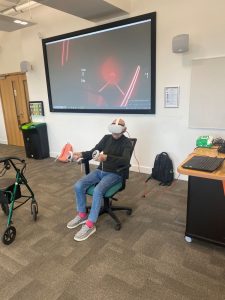I am undertaking a research placement as part of my studies on the MSc Foundations of Clinical Psychology. In my role as a research assistant, I have been working on a project that aimed to introduce the idea of travelling using Virtual Reality headsets for people with dementia and their caregivers/ family members. Virtual reality (VR) technology presents a promising means of bridging geographical divides and empowering individuals with dementia to participate in their communities in ways that were not possible prior to diagnosis. Additionally, research has demonstrated the value of virtual reality in helping people with dementia remember their past, revisit their hometown, or most treasured vacation spots. The purpose of this project is to evaluate how virtual reality can support people with dementia with travel and explore the impact on their wellbeing.
This is a collaborative pilot research study involving BU staff from the Ageing and Dementia Research Centre (ADRC) (Dr. Michelle Heward, Dr. Catherine Talbot, Dr. Michele Board, Dr Aisling Flynn, Lyndsey Bradley) and the International Centre for Tourism and Hospitality Research (ICTHR) (Dr. Daisy Fan, Prof. Dimitrios Buhalis) alongside colleagues from PramaLife (Sue Warr and Jo Keats) and is funded with QR funding from the Department of Psychology. We collected data on campus, and I was able to support this and had an opportunity to engage with the participants. The participants were asked to come to 2 sessions. The first session consisted of a session in the Blended Learning Interactive Simulation Suite, also known as the BLISS room. In this room, the participants and their caregivers were given the chance to play interactive VR games of their choice on the walls or visit different parts of the UK, such as London and Oxford. The second session consisted of using the VR headsets, where the participants were able to use the headsets themselves, which allows them to virtually experience other parts of the world, by looking around and having access to a 360 view, of a location of their choosing, whether that be somewhere they had never been to or reminisce about places they have been.

Given this immense opportunity to relive and reminisce about their previous experiences around the world, and their respective homes, the reception was overall a positive one. The participants left feeling positive about having virtually visited places from their past and having engaged with places they have never been to or would like to go to in the future. They provided some useful insights and feedback to inform future research in this area. We now move towards analysing and publishing the data.
Roshin Sibu
For more information about this project please email Michelle mheward@bournemouth.ac.uk











 3C Event: Research Culture, Community & Cookies – Tuesday 13 January 10-11am
3C Event: Research Culture, Community & Cookies – Tuesday 13 January 10-11am Dr. Chloe Casey on Sky News
Dr. Chloe Casey on Sky News Final Bournemouth University publication of 2025
Final Bournemouth University publication of 2025 On Christmas Day in the Morning…
On Christmas Day in the Morning… New Nepal scoping review on maternal & neonatal health
New Nepal scoping review on maternal & neonatal health ECR Funding Open Call: Research Culture & Community Grant – Application Deadline Friday 12 December
ECR Funding Open Call: Research Culture & Community Grant – Application Deadline Friday 12 December MSCA Postdoctoral Fellowships 2025 Call
MSCA Postdoctoral Fellowships 2025 Call ERC Advanced Grant 2025 Webinar
ERC Advanced Grant 2025 Webinar Horizon Europe Work Programme 2025 Published
Horizon Europe Work Programme 2025 Published Update on UKRO services
Update on UKRO services European research project exploring use of ‘virtual twins’ to better manage metabolic associated fatty liver disease
European research project exploring use of ‘virtual twins’ to better manage metabolic associated fatty liver disease